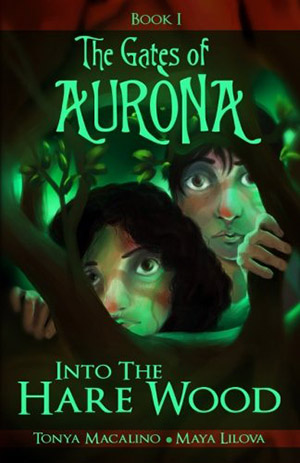[alert variation=”alert-info”]Publisher: Crystal Mosaic Books
Formats: Paperback, eBook, Kindle
Purchase: Amazon | IndieBound | iBooks[/alert]
Hannah and Cameron live in Hillsboro, where they dream of wilder times, of forests without bike trails and graffiti, when there was simply more to the world. They dream of ages when people could be heroes, when it took courage to do great things. They dream of magic. On the first day of summer vacation, they will get what they dream of, whether they are ready for it or not.
“Cats.
More cats than she ever knew lived in the neighborhood—and she thought she knew them all.
At the bottom of each driveway for two blocks, maybe three, a cat sat at attention, ears trained forward to the road. How weird.”
Into the Hare Wood is the first book of the Gates of Auròna, a new middle grade series by Tonya Macalino. It is reminiscent of the Chronicles of Narnia or the Dark is Rising series, a story of seemingly ordinary, contemporary children finding there is more to life, the world, and themselves than they believed. Into the Hare Wood is charming from the outset, with illustrations from Maya Lilova that capture the feel of the characters and the world. The main character, Hannah, is instantly likeable, and Macalino has a gift for revealing deep backstories and complex relationships without slowing the pace of the narrative or dwelling in past events.
“When Dad had been laid off two years ago, snacks stopped being wrapped in fancy plastic and foil. Dad had only found a job around St. Patrick’s Day, so money still wasn’t back up to plastic-wrapped snacks. Pretty early on, Hannah had decided she would trade granola bars and fruit gummies for keeping the house any day.”
There are only two flaws with Into the Hare Wood: One, near the end of the book, a mythohistorical story is conveyed to the protagonists. This recitation of events is a little confusing. While most readers will get the gist, many will be confused about the details. Two, the novel reads like more of a prologue, setting up the rest of the series. While there is revelation, there is no substantive confrontation. This may, however, be one of the few cases where the reader’s reaction isn’t one of frustration, but a desire to read and explore further.
[signoff predefined=”Sponsored Review Program” icon=”book”][/signoff]

